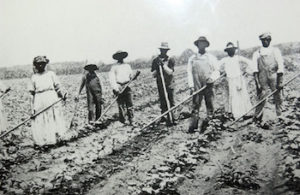
*On this date in 1865, sharecropping is briefly described. Sharecropping historically is a system of agriculture or agricultural production in which a landowner allows a tenant to use the land in return for a share of the crop produced on the land (e.g., 50 percent of the crop).
We chose this date because the 13th Amendment was passed in the United States. With this Amendment, the economic slave-based system of the South was deemed unconstitutional. This should not be confused with a crop fixed-rent contract, in which a landowner allows a tenant to use the land in return for a fixed crop per unit of land (e.g., 1 ton per hectare).
Sharecropping has a long history and encompasses a wide range of situations and types of agreements. Some are governed by tradition, others by law. Legal contract systems such as the Italian mezzadria, the French métayage, and the Spanish Mediero occur widely. Islamic law contains a traditional “musaqat” sharecropping agreement for cultivating orchards. This article will concentrate on American sharecropping.
Following the American Civil War and the abolition of slavery, most freedpeople lacked land or money and had to continue working for white plantation owners. Indeed, many plantations continued to run as large operations where wage laborers or sharecroppers worked, including poor rural whites. Sharecropping gradually became the accepted labor system in most of the Antebellum South. Landowners, short of capital, favored the system because it did not require them to pay cash wages. In addition to the land, the owners usually provided animal power, machinery, and other inputs as an advance. Cabins were commonly rented to the workers. Charges for the land, supplies, and housing were deducted from the sharecroppers’ portion of the harvest, often leaving them with substantial debt to the landowners in bad years.
Sharecroppers received what was left if they could pay back the owners—generally about half of what had been produced under honest arrangements. A string of poor seasons or periods of low prices, coupled with the proliferation of unfair practices with little legal recourse, meant that many sharecroppers were held under the implicit bondage of economic insecurity. Contracts between landowners and sharecroppers were typically harsh and restrictive. Many contracts forbade sharecroppers from saving cotton seeds from their harvest, forcing them to increase their debt by obtaining seeds from the landowner. Landowners also charged high interest rates.
Landowners often weighed harvested crops themselves, which presented further opportunities to deceive or extort sharecroppers. Also, financially distressed landowners could rent land to Black sharecroppers, secure their debt and labor, and drive them away just before it was time to harvest the crops. Southern courts were unlikely to rule in favor of Black sharecroppers against white landowners. The Great Depression devastated sharecropping, as did the South’s continued overproduction of an overemphasis on cotton and the ravages of the destructive boll weevil. Cotton prices fell dramatically after the stock market crash of 1929, and the ensuing downturn bankrupted farmers.
The Agricultural Adjustment Act of 1933 offered farmers money to produce less cotton to raise prices. Many white landowners kept the money and allowed the land previously worked by sharecroppers to remain empty. Landowners also often invested the cash in mechanization, reducing the need for labor and leaving more sharecropping families, Black and white, underemployed and impoverished. Sharecropping in the United States gradually died out after World War II as the mechanization of farming became widespread. So, too, Blacks left the system as they moved to better-paying industrial jobs in the North during the Great Migration. Similar forms of tenant farming are still found in some places worldwide.